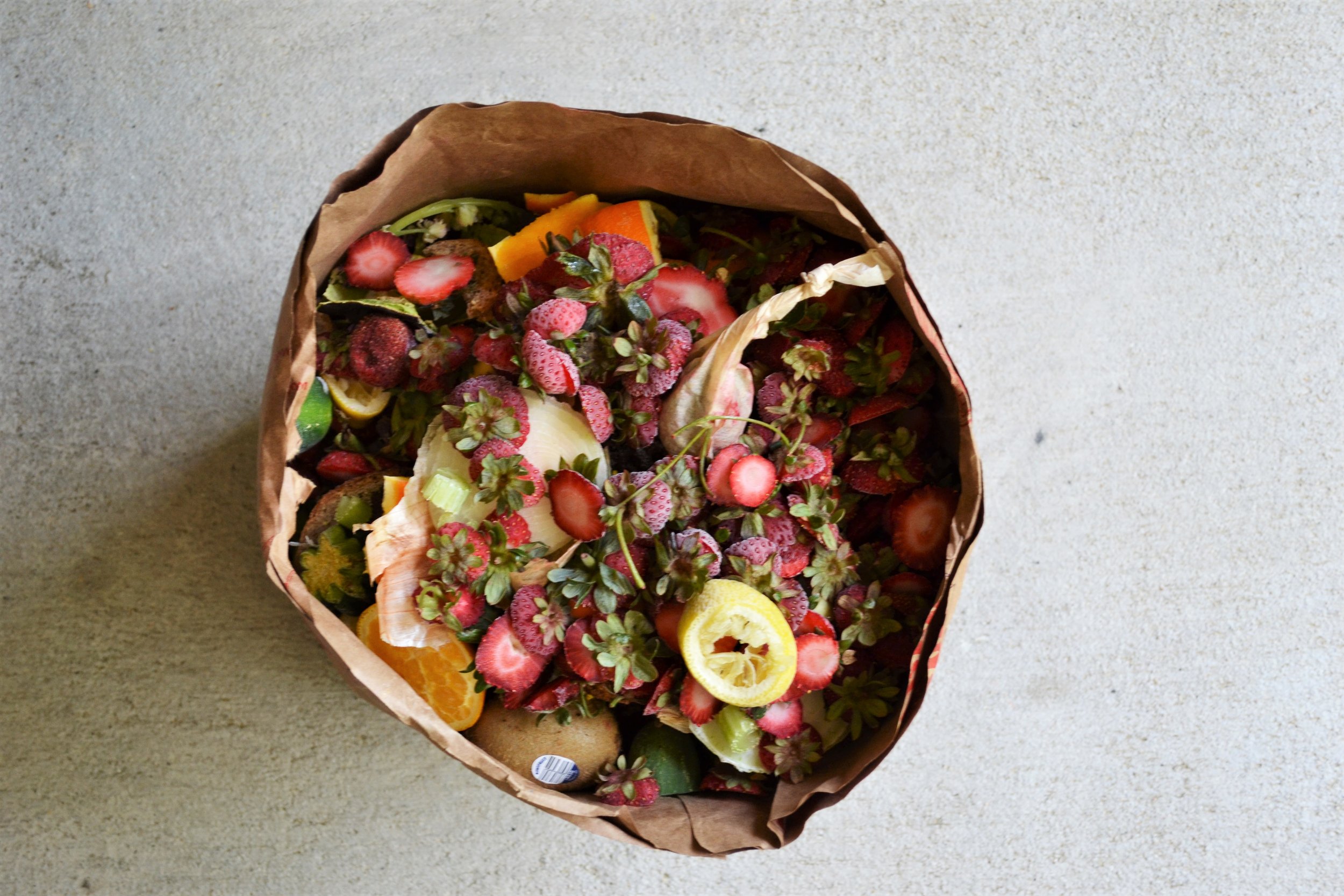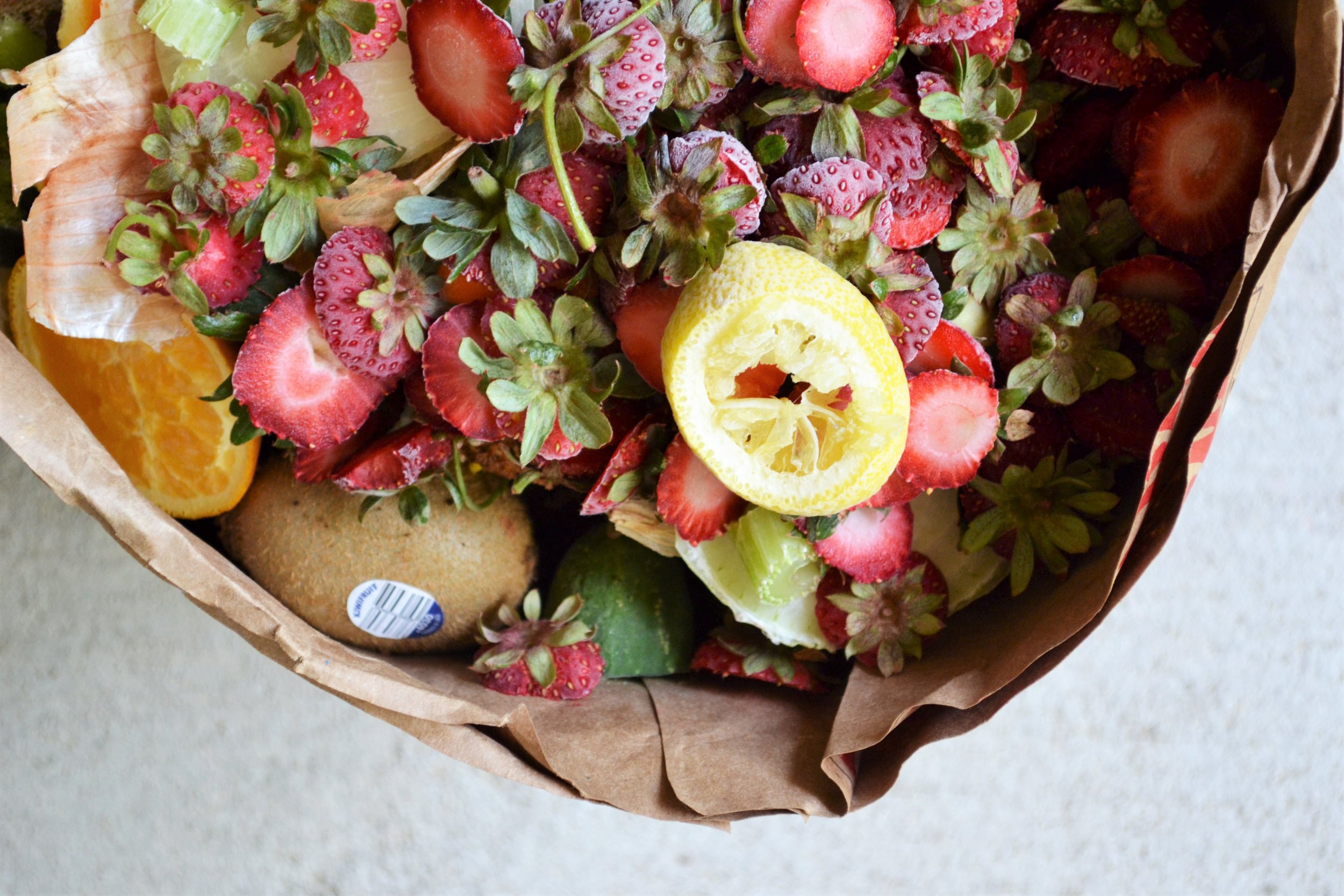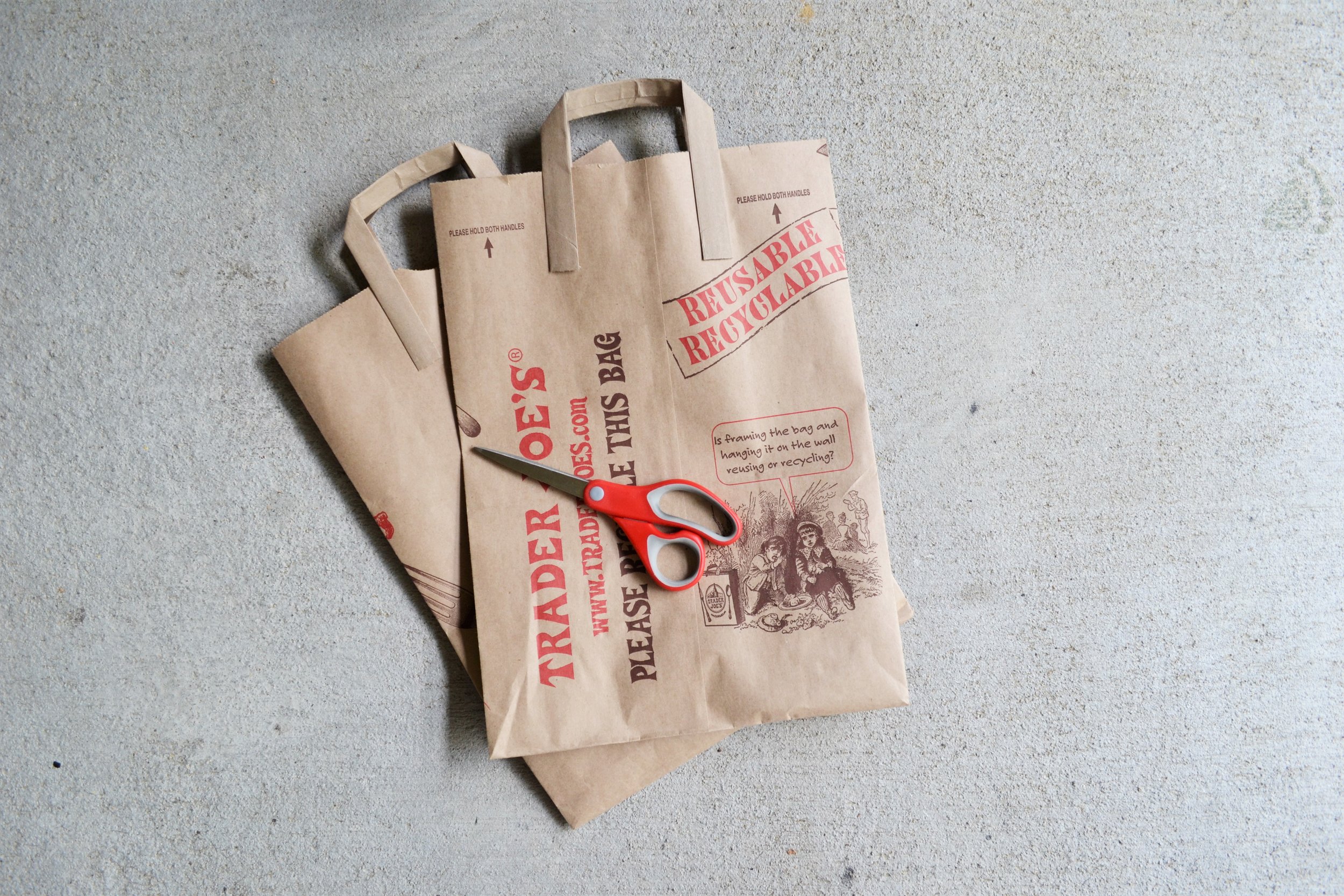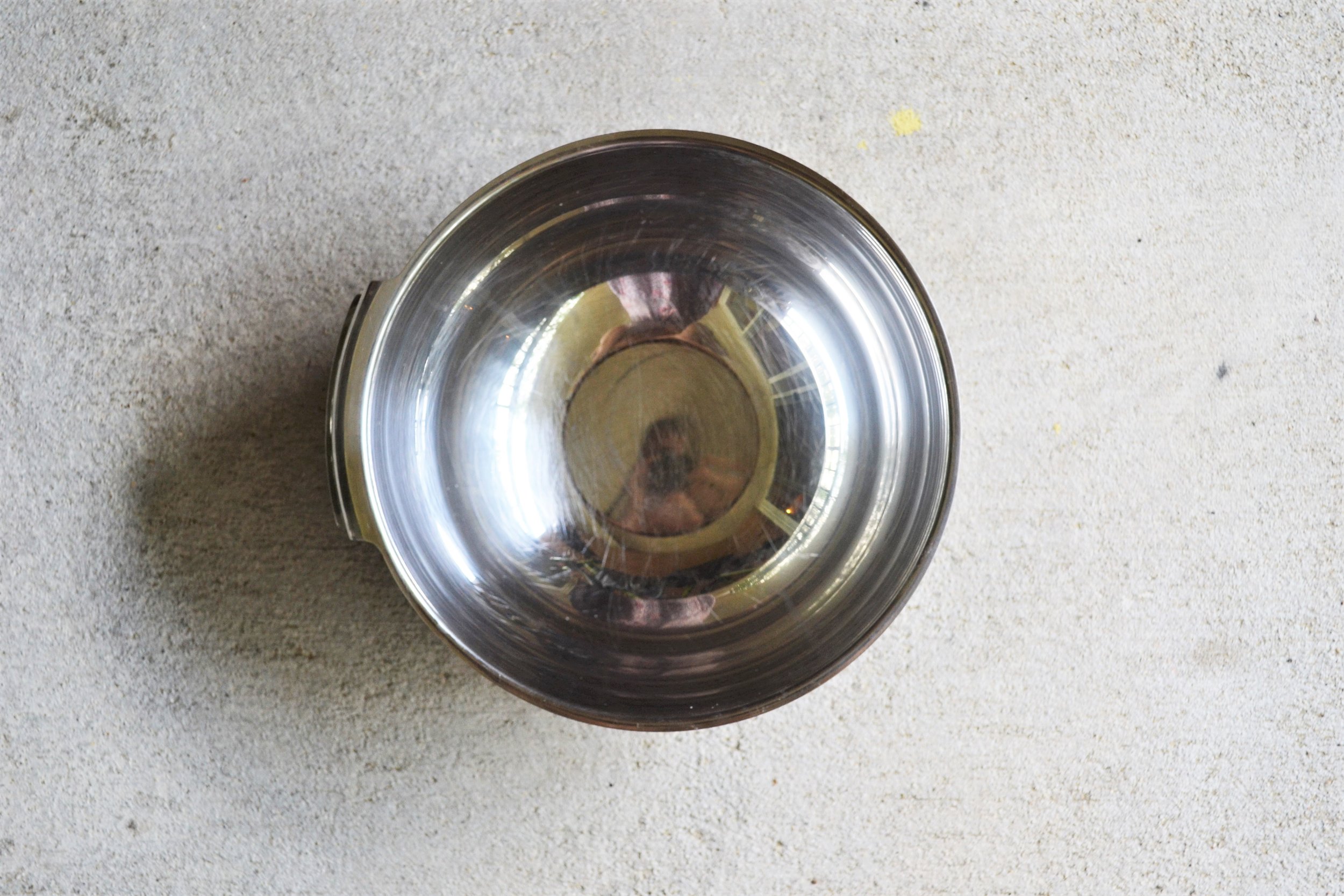Composting 101

Okay guys, today I want to talk to you about composting! I literally get so excited about this topic because number one, its so easy to do and two, its a significant step in reducing the amount of trash that ends up in landfill.
As I began to explore the whole world of “zero waste” a couple years back I became increasingly aware of how much trash my husband and I were producing. Even after recycling and limiting our consumption, it seemed like the s+*t was pilling up. I knew that composting would make a significant difference however I wasn't sure where to start (we’ll all that here today). Living in an apartment with no yard seemed to rule out some options... One idea was to purchase a composting unit and then see if a vendor at our farmers market would like our compost for their land. However that seemed a like a lot of effort... Plus, our farmers market is only open March - November which would leave us with not being able to compost during the winter months. I researched some other ideas, eventually having an AHA moment, after watching this video by Trash Is For Tossers and talking to an employee at Whole Foods. I found that instead of purchasing a composting unit or trying to work around our Farmers Market schedule, I could simply put our compost in a paper-bag that would chill in our freezer. Once full I could drop it off in the bin labeled “compost” at *Whole Foods.


BAMBOO
COFFEE GROUNDS
EGG SHELLS
EGG CARTONS
STALE BREAD
VEGETABLES/FRUITS
LEAVES & TWIGS
EXPIRED FOOD
LEFT OVERS
LOOSE TEA
MATCHES
SOILED PAPER
DRY GRASS CLIPPINGS
WOOD SHAVINGS
NUTSHELLS
PAPER NAPKINS
PAPER TOWELS
WAX PAPER
SHREDDED PAPER
SOILED CARDBOARD

MEAT OR ANIMAL FAT | This will attract unwanted pests and will not break down properly.
INFESTED PLANTS | If your plants suffer from infestation, avoid throwing them in with the rest of your compost, as this could lead to infestation of your future garden.
HIGH LEVELS OF FAT | Do not pour oil into your compost as some bins don't get hot enough to break down a lot of fat.
PET WASTE | Leave this out if you plan on using your compost on edible plants.
NON-ORGANIC MATERIAL | Plastics, chemicals, pesticides...If you wouldn't want it in your garden you won't want it in your compost!

How you compost depends on a few factors: cost, location, aesthetics, involvement, and capacity. Some systems are free while others require investing in a unit. If you have a yard you can either purchase a compost tumbler or throw your scraps into a corner of your yard, turning them over every so often with a pitch fork. A compost tumbler is great because by turning it each day the compost is able to decompose at a faster rate. Vermicomposting works in the city or the suburbs but is not for the faint of heart! Worm castings create some of the richest, most nutritionous soil ("black gold") that you can use in your garden or sell. Bokashi composting is where scraps are collected and a speical bokashi bran is added, which helps scraps break down anaerobically; basically fermentation for your compost. It takes a couple of weeks and occurs in a bucket. This option is works well if you live in the suburbs or if you live in the city and have a balcony. Smart Composters are the most costly options but work anywhere. They do a great job at keeping smells away, can be stored in a cabinet, and, like the bokashi, churn out compost in about two weeks. There are many more options out there, created to fit your needs and lifestyle. While these options are available for purchase, you can always get creative and use items that you already have, to make your own system.

*Since writing this article, we found a local friend (with a backyard!) who accepts our compost. This has made the composting process so much easier for our family, as we’re not having to make a special trip to Whole Foods. Plus, our friend loves having our scraps for fresh soil!
We love connecting with y’all through beautiful photos on our feeds but there is just something more personal about a video. It is our hope that we will be able to provide consistent video content about our projects, our mission and our adventures.
We here at Making Room for Peace are celebrating today by getting outside (at a social distance) to soak in some sun, breathe in some fresh air and hold gratitude for this beautiful Earth and all that it provides us with.
Not being the most experienced of gardeners, we’ve rounded up a list of plants that are relatively low-maintenance indoor plant, that are easy to grow.
In light of our climate change crisis, we as a small business wanted to look within to identify ways in which we could make positive change.
So many of you have been asking about this piece and how to make something similar, so today we are giving you the step-by-step on how to create a sculptural wall hanging.
When shopping for storage containers you want to make sure that they check off three boxes: beauty, functionality, and sustainability.
One of our core values here at Making Room for Peace is adopting a slower way of life. This movement, also known as “slow living” stands for "sustainable, local, organic, and whole and is about having little impact, shopping local and avoiding mass produced and processed things."
Over the past couple of years, we have methodically worked together on styling the Hurt’s home, infusing their love of vintage and travel finds with the more traditional bones of the space. It has been such a pleasure getting to know Rebecca not only as a client but as a friend. Today, Rebecca shares with us a little bit about herself and how she is currently making room for peace.
People matter more than the things that we buy is a belief held close to our hearts as well as our friends at Made. Owner Holly and her team work hard to ensure that every item that Made sells supports this belief not just in theory but in action, by caring for the artisans who make their products.
Why not elevate your gift wrapping this holiday season by using some sustainable alternatives to all of the wrapping paper, bubble wrap, or cello sheets out there? Not only will you show your loved ones how much you care about them but also how much you care about the environment!
When I would think of thrift stores and consignment shops I would envision dirty, poorly lit spaces with clothing that couldn’t possibly be stylish or in good condition. Years later, through some humbling and personal experience, I’ve found that this image that I had had in my mind couldn’t be farther from the truth. While shopping second-hand can be hit or miss, for the most part it is really an enjoyable experience.
Our homes are supposed to be our refuge but did you know that they could also be making us sick? Asthma, headaches, coughing, and allergies are just a few of the signs that you may need to make some changes to your home. Lucky for you, we've outlined some of the problem areas and what you can do to create a healthier environment for you and your family!
When most of us hear the term "slow living", we envision a simple life filled with meditation, a peaceful home and time spent in nature. It wasn't until recently when I read this article, that I fully grasped what the slow living movement represents.
Rebeca Howe is one of those people who when you first meet, you immediately feel at home with. Her warm, bubbly personality lights up every room that she walks into; and her words of affirmation leave you feeling loved and valued.
There are so many single use items that we (myself included!) use on a regular basis without even thinking about it... plastic bags, Styrofoam cups, plastic utensils... the list could go on and on! Instead of feeling overwhelmed by all of the waste that we're causing and that is going on around us I would like to encourage you to take a deep breath and start where you are, doing what you can.
Summer is our favorite time of year for many reasons, one being the large selection of produce that is in season. The list goes on and on of brightly colored, flavorful fruits and vegetables that are wonderful alone or combined into a seasonal dish.
When it comes to holistic cleaning products all you really need is three ingredients: distilled white vinegar, baking soda, and Castile soap. Distilled with water, these ingredients are more than capable to tackling everything from a dirty counter to a grimy bathtub. All are budget-friendly and can be found at your local grocery and hardware store.
Spring has officially arrived and with it, a colorful, bountiful spread of fresh produce... Asparagus, chives, fennel, and watercress are just a handful of the produce and herbs available at your local farmers market and grocery store.
Most of y'all know by now that I love shopping second hand. Consignment stores, thrift shops, antique stores... You'd be amazed at what you can find. Whether your looking for furniture, home decor, clothing, books, or appliances - these places have it all and more; gently used and at great prices. Not only that, but as these pieces are "gently used" your automatically taking your style and sustainability game up a level.
While we may not associate winter with fresh produce, it is in fact a season that offers an array of fruits and vegetables with tart, tangy flavor; along with some more calm flavors.
With the current FDA regulations that we have in our country its hard to know what exactly is in our products and who to trust. I recently met up with Karrianne Drury and Rachel Rhodes of Young Living Essential Oils to find out more about essential oils and to talk all things family and holistic living.
While I must confess that I have been known to shop out of season, when I do I find myself sorely disappointed. Not only is the out of season product more expensive but the flavor is watery and tart. I mean really, nothing beats summer blueberries. Not only are they sold in abundance but they are also jam-packed with flavor and nutrients. This is no coincidence.
I've never been a fan of a perfectly precise bouquet much preferring something organic and wild. Local florist, Diane Fulton of Front Porch Flower Co. is the same way.
Over the past year by doing a little problem solving and prep-work we've been able to minimize some of our kitchen waste by implementing a few practices.
Not only are natural storage containers a healthier choice for you and your family, they are also less harmful to the environment. Bonus they are way more stylish and are often more durable! For example, items made out of real wood, especially older wood, are quite strong.
When I first heard about this concept of living waste free I was skeptical. So many things now a days are made of plastic and come in excessive packaging. How on earth can people like you and me live in a modern day society and not produce any waste?
While it has felt so good to purge of what I no longer need or wear, I found that after taking bag after bag of clothing, shoes, and accessories to Good Will over the years I started to feel guilty.
Like most engaged couples, my husband and I were blessed to have been gifted with furniture from family. Even better, everyone was so kind in not being too pushy with their gifts. If we didn't like it or felt that we didn't have space for it, they were okay with that. While most of the pieces of furniture, we kept as is, one of the pieces that I altered was our sofa and love-seat.
Composting at home is as a easy, rewarding way of making an environmental impact. It doesn't matter whether you live in an apartment in the city or are out in the suburbs, everyone is able to compost.


































I don’t want to say, “oh yeah, I care about sustainability. I care about ‘the least of these.’”. But not do anything. So this Earth Day, let’s DO SOMETHING.